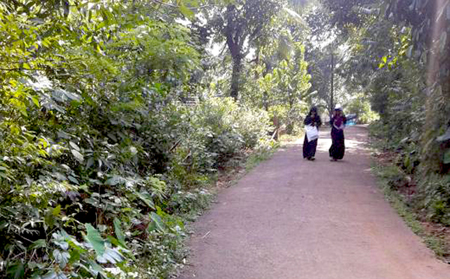
Kaniyoor, October 14: It started as small incidents, destroying boards and banners of the village masjid and taunting devotees headed for prayers. However, the jeering turned into physical assault on September 27, when a group of around 10 men, clutching swords and rods, descended on the village and attacked a villager.
Fear is palpable in Abbada village, off Puttur-Kukke Subramanya State Highway in Dakshina Kannada district, where out of 30 families, 10 are Muslim. Villagers refused to talk in the open, fearing that someone might tip off Hindu rightwing groups responsible for the assault.
They suggested Badria Jumma Masjid, a half-kilometre away, to talk in, and chose to walk in pairs and at a distance so as not to “arouse suspicion”.
“What can we do?,” said Mohammad Asraf. “We are very few in numbers. The men are daily-wage labourers and for most of the day only women and children are in the village. If they [Hindu rightwing groups] suspect anything, it is easy to target us.”
Most of those who spoke have spent most of their lives in the village, and recollected no discrimination or violence against them before Ramzan this year.
Three months ago, a concrete board showing the way to the mosque was destroyed. Then, in increasing frequency, green flags and banners put up around the masjid during festivities were cut and flung aside.
The people of the village said men on bikes ripped banners with blades and fled when villagers spotted them.
Abdul Shakir said the harassment became brazen when groups of men congregated at the turn-off to the mosque and verbally abused those headed for prayers.
Then, little more than a month ago, Abdul Khader (52) was accosted by a group of men when he was grazing his calf. “They asked if I was going to slaughter it. Though I said no, they swore at me, beat me, and took away my calf,” he says.
One of the assailants was a cattle dealer Mr. Khader used to deal with. “They think because a Muslim has a cow, he is going to slaughter it. I have stopped trading cattle because of this,” he said.
On September 27 around 9.30 p.m., Bajrang Dal activists, as recognised by the people of the village and the police, circled the village on bikes and a jeep.
They banged the doors of Muslim houses. As the Muslim men had gone for prayers at the time, only the women were in the houses.
A woman said she locked her door and switched off the lights hoping the group would go away.
Ravindranath Rai, a farmer, chased two activists to the fringes of the village — which is midway between the village and the masjid — where the rest of the group pounced on him.
Children who were returning early after prayers witnessed the attack, and their screams attracted the attention of those in the masjid. Mr. Rai was rescued just as the Bajrang Dal men attempted to run him over with their jeep. The jeep instead struck an electric pole.
Umar Farooq, 14, said he was now terrified to go to madrasa for evening classes. Mohammad Arshad, 12, who heard the men menacingly gesturing that “the Beary children were being let out”, said his mother had to force him to attend madrasa.
“I make her come along with me,” said the boy.
Villagers said they now stayed indoors as much as possible.
“If they can assault a Hindu for supporting us, imagine what they can do to us. Moreover, after filing cases against them, we fear they will target us. We will trade our freedom [of movement] any day for peace,” said one.
The rightwing activists on September 28 filed a counter police complaint against 22 Muslim men of the village. The activists alleged that the Muslim men attacked them and damaged their jeep.







Comments
Add new comment